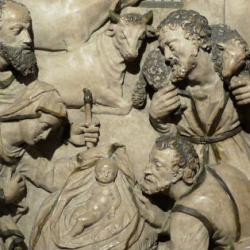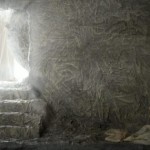January 6 is the day of Epiphany in the church calendar. It’s the day when the three wise men arrived from the east to worship Jesus Christ, a child born of a virgin, the Lord of glory.
True to form, the wise men were late.
The event they had come to witness was of such moment that the span of human history is measured around it. The birth of Jesus Christ is so pregnant with meaning that the entire chronicle of human history numbers its days upon it. Empires rise and fall, but Christianity has spread with each succeeding year. They are clear and obvious signs.
Yet we should also remember that rejecting Christ as Lord, as Herod did, has hellish consequences: for Herod, the King who held onto power like it was his God, used his power to seek the life of God’s own Messiah. In his desperate rage, Herod slaughtered a town of innocent babes.
Yet for those whose computer vision syndrome neatly coalesces with a belief that we are on the arc of history, appealing to historical standards is not particularly persuasive.
All the same, promoting laws that reject Christ’s lordship in the name of liberating ourselves from the laws of the created order has an effect like loosing the laws of gravity.
A cosmic analogy
Let me embellish the analogy: the distance of the earth from the sun is so finely calibrated that its light and heat can sustain life. It is one of the things that has led many to observe an anthropic principle behind the design of the universe. [It is thus a cause of the greatest amusement to me that those who ridicule the very idea of the virgin birth often blithely uphold a parthenogenic universe. But I digress.]
The weight of the sun – some billion billion billion tonnes of hydrogen – creates a gravitational force that maintains the other planets around its orbit. And it is the intense pressure of the colossal weight that also causes the bright centre of our solar system to emit heat, much as air pressure heats a pump valve when we inflate our tires.
There is no reason to think we could not cause the same heat if we substituted an equivalent substance – say a billion billion billion tonnes of bananas. It is an amusing thought. Of course, without hydrogen, there would be no fusion reaction to maintain the heat. Any initial heat and light would rapidly cool, and death would ensue on earth.
So bananas simply will not do.
With that in mind, let’s consider the effect of decoupling the law from preserving the sanctity of life.
The moral ‘gravity’ of the sanctity of life
The preamble to Canada’s 1982 Charter of Rights and Freedoms begins with the line “whereas Canada is founded upon principles that recognize the supremacy of God and the rule of law”. ‘Whereas’ functions in legal documents to declare the foundation for what follows, in this instance the rights and freedoms delineated thereafter.
Because the word supremacy is meaningless if can be diminished, it ought to be impossible for rights and freedoms to be accepted that diminish, let alone deny, God’s supremacy. On the other hand, unless we think that human beings have no rights or freedoms, God’s supremacy does not entail that we have none.
The character of God and our relation to him is the question. All of Canada’s founding documents attest to the fact that God is our Creator, and that human life has a sanctity because we are persons who bear His image.
Nevertheless, for the past forty odd years, the gravity of Canadian society has shifted by the weight of the legal and societal equivalent of bananas being placed on the scales of justice.
There is no clearer illustration of this than in the removal of safeguards upon the life of the unborn, although defining life is the sole prerogative of the Creator.
Unlike the United States, the Supreme Court of Canada has never ruled that a woman has a constitutional ‘right’ to an abortion. It merely struck down the existing law (Section 251) for procedural inequities under the ‘security of person’ phrase of Section 7 of the Charter. No judgement has ever been rendered on the constitutional rights of the unborn child. Like China and North Korea, we simply have no law at all.
Yet the black hole surrounding the legal rights of the unborn child has had the effect of gravity. The heat and pressure is inordinate. It crushes the unborn. We can also witness that every fundamental freedom delineated in section 2 of the Charter is being denied to pro-life advocates, just as life has been for the unborn victims would they defend.
In the week leading up to Christmas, the CBC reported that a woman at the 35-week mark in her pregnancy aborted her full-term child. The legal black hole in Canada’s laws led Canada’s state broadcaster, not to decry the killing, but to express concerns about the mother’s ease of access to her supposed rights.
The absence of legislation is a black hole whose weight has functioned to sanctify the taking of unborn life as if it were our birthright. Every five minutes in Canada, the life of a child is officially taken, sanctified as women’s rights, and financed as healthcare.
The preamble to Canada’s Charter declares not just the supremacy of God, but that we are a nation that recognizes the rule of law. Without laws protecting and upholding the sanctity of life, black holes will exercise a gravitational force endangering those nearest and dearest to us.
The weight of the cross
The physical weight of the little lord of glory once barely made an impression on the hay of a manger. Yet the cosmic moral weight of human sin crushed his adult body on the cross; his resurrection won eternal life for every believer; and his ascension means that he now lives and reigns as Lord of all things with the Father and the Holy Spirit.
May this be the year that your weightless rebellion ends.
The Lord is gracious, even to those who are late to the party. He accounts them wise.











